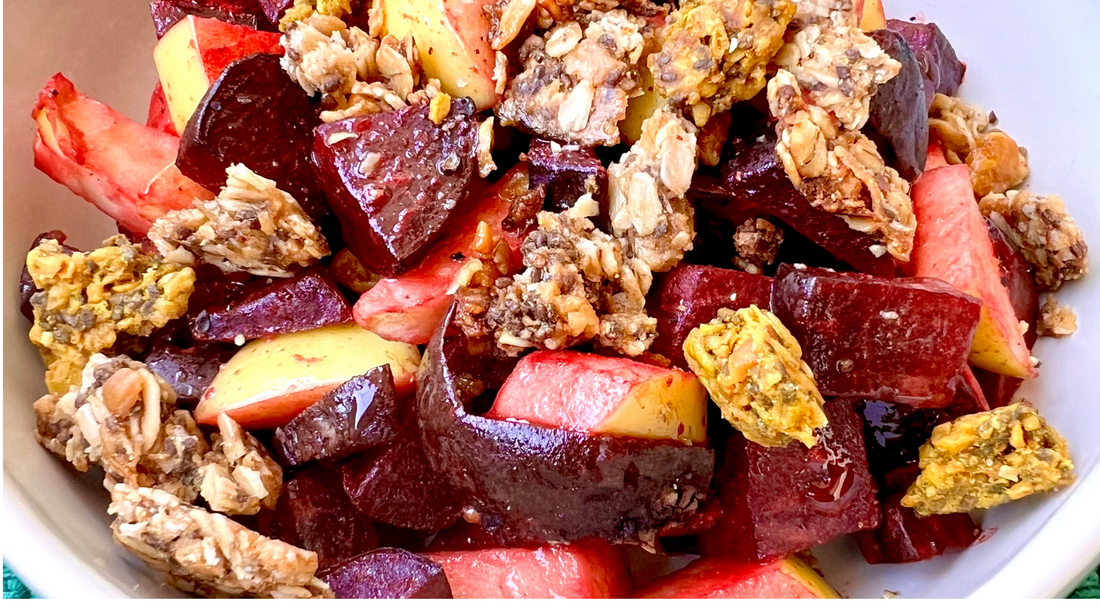What is Pectin? Benefits for Gut Health and Top Pectin-Rich Foods
Share

When we think of foods that support gut health, fiber often takes center stage. But there’s a special type of fiber, often overlooked, that plays a powerful role in nourishing our gut microbiome—pectin. Found naturally in many fruits and vegetables, pectin is a versatile carbohydrate that offers both culinary and health benefits. Let's dive into what pectins are, how they benefit our gut, and the foods that provide this gut-loving compound.
What is Pectin?
Pectin is a type of soluble fiber found in the cell walls of fruits and vegetables. Its primary function in plants is to help maintain structure and firmness. In the culinary world, pectin is prized for its ability to form gels, making it a staple in jams, jellies, and preserves.
But pectin isn’t just a friend to your favorite spreads—it’s also a major ally for your gut. When consumed, pectin ferments in the gut, acting as a prebiotic, which means it serves as food for the beneficial bacteria in your microbiome.
How Pectins Effect Our Gut
-
Fuel for Beneficial Bacteria
-
Pectin serves as a prebiotic, helping to nourish and grow beneficial gut bacteria like Bifidobacterium and Lactobacillus. A thriving population of these microbes is linked to better digestion, improved immunity, and even mood regulation.
-
Supports Gut Lining
-
Pectin fermentation produces short-chain fatty acids (SCFAs), such as butyrate, which help maintain the integrity of the gut lining. A healthy gut lining prevents unwanted substances from leaking into the bloodstream—a condition known as leaky gut.
-
Regulates Digestion
-
Thanks to its water-binding properties, pectin can help with both constipation and diarrhea. It adds bulk to stool while softening it, creating a balancing effect for digestive health.
-
Anti-Inflammatory Effects
-
By supporting the growth of beneficial microbes and reducing harmful bacteria, pectin may help lower inflammation in the gut and beyond.
Foods High in Pectin
Pectin levels vary depending on the type of food and how it’s prepared. Here’s a list of pectin-rich foods to include in your diet:
Fruits and Vegetables High in Pectin
-
Apples
Particularly the peel, apples are one of the richest sources of pectin. Cooking apples, such as for applesauce, increases the availability of pectin. -
Citrus Fruits
Oranges, grapefruits, lemons, and limes have high pectin concentrations, especially in their peels and white pith. -
Plums and Prunes
These fruits are gut-friendly powerhouses, with pectin and other fibers to support digestion. -
Berries
Strawberries, blackberries, and raspberries contain moderate levels of pectin, especially when slightly underripe. -
Quinces
Often overlooked, quinces are packed with pectin and are frequently used in jams. -
Pears
Pears are another excellent source, especially when consumed with their skins. -
Carrots
Cooking carrots can release their pectin, making them easier to digest while still retaining their gut-friendly benefits. -
Potatoes (with skins)
Potatoes, especially when boiled, release a small amount of pectin. -
Beets
Both raw and cooked, beets provide pectin to aid digestion and microbiome diversity.
How Cooking Impacts Pectin
Pectin's properties change during cooking. Heating fruits and vegetables can release pectin, making it more bioavailable. For example:
- Applesauce is a great source of pectin because cooking breaks down the apple cell walls, releasing the pectin.
- Jam-making leverages pectin’s natural gelling properties as it’s activated by heat and acidity.
The Takeaway
Pectin is more than just a natural gelling agent—it’s a gut-health powerhouse. By incorporating pectin-rich foods into your meals, you’re not only feeding your body but also nourishing your microbiome. Whether it’s applesauce, roasted carrots, or a handful of berries, there are countless delicious ways to enjoy the benefits of pectin.
Looking for more ways to care for your gut? Try out our gut friendly granola that will ensure you are getting lots of prebiotic fibers and nourishment with our carefully crafted formula. The recipe above is our favorite beet salad which is super high in pectins and other prebiotics!
